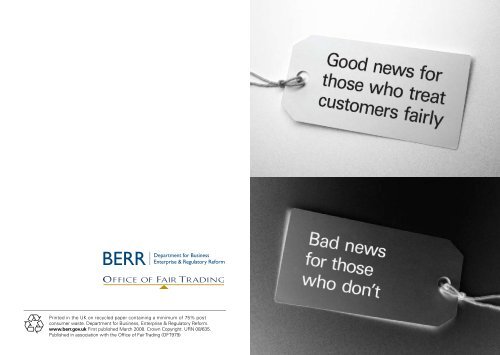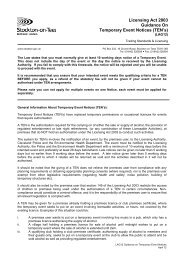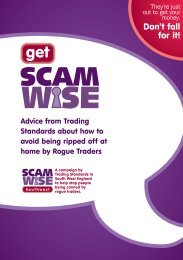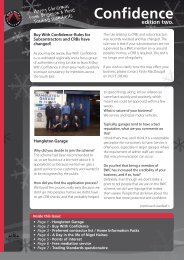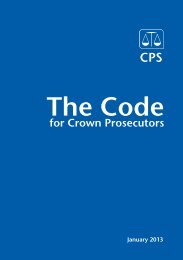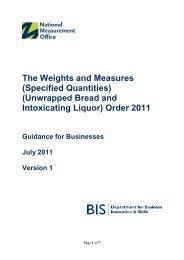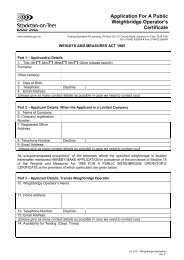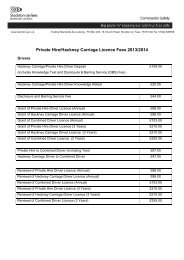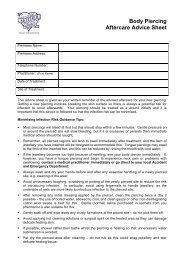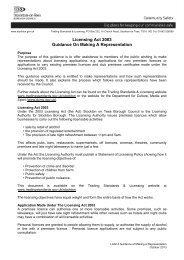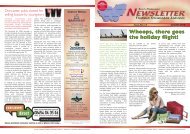Consumer Protection from Unfair Trading ... - DTI Home Page
Consumer Protection from Unfair Trading ... - DTI Home Page
Consumer Protection from Unfair Trading ... - DTI Home Page
Create successful ePaper yourself
Turn your PDF publications into a flip-book with our unique Google optimized e-Paper software.
Printed in the UK on recycled paper containing a minimum of 75% postconsumer waste. Department for Business, Enterprise & Regulatory Reform.www.berr.gov.uk First published March 2008. Crown Copyright. URN 08/635.Published in association with the Office of Fair <strong>Trading</strong> (OFT979)
The <strong>Consumer</strong> <strong>Protection</strong><strong>from</strong> <strong>Unfair</strong> <strong>Trading</strong> Regulations:a basic guide for businessWhat are the benefits for business?Businesses will no longer have to face unfair competition<strong>from</strong> traders who use underhand practices. The changeswill also simplify consumer protection in the UK and acrossthe EU, making it clear which commercial practices are – andare not – allowed.What are the regulations?What do I need to do?The Department for Business, Enterprise and RegulatoryReform are introducing new regulations to clamp down on unfairsales and marketing practices. They are designed to protectconsumers and honest businesses. Everyone who deals withconsumers will be affected including retailers, builders andsecond-hand motor traders.Many detailed rules around trade descriptions and misleadingprice indications are being replaced with a general ban on unfairtrading. This broadly means traders will have to act in a waythat enables the average consumer to make free and informedpurchasing decisions.In addition, they will put a stop to aggressive selling techniquesand misinforming and misleading people about products orservices. You’ll find these, the practices they cover and someexamples at the end of this booklet.Businesses that deal fairly and honestly with their customersmay not need to change the way they work at all. But to makesure you’re treating your customers properly, you and your staffmust read and understand these new regulations.What happens if I don’t follow them?If you don’t comply with these regulations, your company maywell be investigated by your local authority’s trading standardsservice and other bodies. These lengthy investigations couldtake up a lot of your business time and you could also beprosecuted and fined. You could also lose your customers.01 02
Where can I go for advice?For practical business advice and to find out more about theseregulations, please visit one of the following websites:www.businesslink.gov.uk/unfairtrading for Englandwww.bgateway.com/unfairtrading for Scotlandwww.hiebusiness.co.uk/unfairtrading(Scottish Highlands & Islands)www.businesseye.org.uk for Waleswww.nibusinessinfo.co.uk/unfairtrading for Northern IrelandYou can also contact your local authority’s trading standardsservice for further advice on the regulations.03 04
What do the new regulations cover?The new regulations ban traders in all sectors <strong>from</strong> using unfaircommercial practices towards consumers. They set out broadrules outlining when commercial practices are unfair. These fallinto four main categories:• A general ban on conduct below a level which may beexpected towards consumers (honest market practice/goodfaith). This is intended to act as a “safety net” protectionfor all consumers.• Misleading practices, like false or deceptive messages,or leaving out important information.• Aggressive sales techniques that use harassment, coercionor undue influence.For a practice to be unfair under these rules, they mustharm, or be likely to harm, the economic interests of theaverage consumer. For example, when a shopper makesa purchasing decision he or she would not have made hadhe or she been given accurate information or not put underunfair pressure to do so.• In addition, the regulations ban 31 specific practicesoutright. These practices are set out on the following pages.05 06
The following practicesare banned outright:Falsely claiming accreditation1. Faking credentialsClaiming to be a signatory to a code of conduct whenthe trader is not.2. You’re not who you say you areDisplaying a trust mark, quality mark or equivalent withouthaving obtained the necessary authorisation.3. Your endorsement is not realClaiming that a code of conduct has an endorsement <strong>from</strong>a public or other body which it does not have.4. Not being true to the terms of the endorsementClaiming that a trader (including his/her commercialpractices) or a product has been approved, endorsedor authorised by a public or private body when he/she/ithas not, or making such a claim without complying withthe terms of the approval, endorsement or authorisation.A builder claims that he is registered under the ‘ † TrustMark’scheme when he is not. This would breach the regulations.07The definitions used in this section are taken<strong>from</strong> the <strong>Consumer</strong> <strong>Protection</strong> <strong>from</strong> <strong>Unfair</strong> <strong>Trading</strong>Regulations Guidance document, published March 2008.†TrustMark is a scheme which helps consumers find reliable,and trustworthy tradesmen to undertake home repairsand improvements.08
Pricing and product/service information5. Special offer – not in stockMaking an invitation to purchase products at a specifiedprice, without disclosing the existence of any reasonablegrounds the trader may have for believing that he/shewill not be able to offer for supply or to procure anothertrader to supply, those products or equivalent productsat that price for a period that is, and in quantities that are,reasonable having regard to the product, the scaleof advertising of the product and the price offered.This is known as bait advertising.6. Limited time onlyFalsely stating that a product will only be available for a verylimited time, or that it will only be available on particularterms for a very limited time, in order to elicit an immediatedecision and deprive consumers of sufficient opportunityor time to make an informed choice.7. Illegally selling goodsStating or otherwise creating the impression that a productcan legally be sold when it cannot.8. It’s not rightPresenting rights given to consumers in law as a distinctivefeature of the trader’s offer.10. Promoting a product you don’t want to sellMaking an invitation to purchase products at a specifiedprice and then:(a) Refusing to show the advertised item to consumers;Or (b) Refusing to take orders for it or deliver it withina reasonable time;Or (c) Demonstrating a defective sample of it, with theintention of promoting a different product (knownas bait and switch).11. Scare tacticsMaking a materially inaccurate claim concerning the natureand extent of the risk to the personal security of theconsumer or his or her family if the consumer does notpurchase the product.12. Creating extra paperworkRequiring a consumer who wishes to claim on an insurancepolicy to produce documents which could not reasonablybe considered relevant as to whether the claim was valid, orfailing systematically to respond to pertinent correspondence,in order to dissuade a consumer <strong>from</strong> exercising his/hercontractual rights.9. Over promise, under deliverFalsely claiming that a product is able to cure illnesses,disfunction or malformations.0910
Promotional activities13. Being honest about advertorialsUsing editorial content in the media to promote a productwhere a trader has paid for the promotion (advertorial)without making that clear in the content or by imagesor sounds clearly identifiable by the consumer.14. Faking goodsPromoting a product similar to a product made by aparticular manufacturer in such a manner as deliberatelyto mislead the consumer into believing that the productis made by that same manufacturer when it is not.A trader designs the packaging of shampoo ‘A’ sothat it very closely resembles that of shampoo ‘B’,an established brand of a competitor. If the similaritywas introduced to deliberately mislead consumersinto believing that shampoo ‘A’ is made by thecompetitor (who owns shampoo ‘B’) – this wouldbreach the regulations.15. Closing down saleClaiming that the trader is about to cease trading or movepremises when he/she is not.16. Pulling the wool over their eyesPassing on materially inaccurate information on marketconditions or on the possibility of finding the productwith the intention of inducing the consumer to acquirethe product at conditions less favourable than normalmarket conditions.17. Forcing the dealIncluding in marketing material an invoice or similardocument seeking payment which gives the consumer theimpression that he/she has already ordered the marketedproduct when he/she has not.18. A wolf in sheep’s clothingFalsely claiming or creating the impression that thetrader is not acting for purposes relating to his/her trade,business, craft or profession, or falsely representingoneself as a consumer.19. Advertising to childrenIncluding in an advertisement a direct exhortation tochildren to buy advertised products or persuade theirparents or other adults to buy advertised products for them.13 1111 12
Competitions and Prize Draws20. Pyramid schemesEstablishing, operating or promoting a pyramid promotionalscheme where a consumer gives consideration for theopportunity to receive compensation that is derivedprimarily <strong>from</strong> the introduction of other consumers intothe scheme, rather than <strong>from</strong> the sale or consumptionof products.21. You can’t promise a winClaiming that products are able to facilitate winningin games of chance.22. Winner takes nothingClaiming in a commercial practice to offer a competitionor prize promotion without awarding the prizes describedor a reasonable equivalent.23. Is it truly free?Describing a product as ‘gratis’, ‘free’, ‘without charge’ orsimilar if the consumer has to pay anything other than theunavoidable cost of responding to the commercial practiceand collecting or paying for delivery of the item.24. No win situationsCreating the false impression that the consumer has alreadywon, will win, or will on doing a particular act win, a prize orother equivalent benefit, when in fact either:– There is no prize or other equivalent benefit,Or – Taking any action in relation to claiming the prize orother equivalent benefit is subject to the consumerpaying money or incurring a cost.1314
Sales and After-Sales Service25. Forcing the saleCreating the impression that the consumer cannot leave thepremises until a contract is formed.26. Overstaying your welcomeConducting personal visits to the consumer’s home andignoring the consumer’s request to leave or not to return,except in circumstances and to the extent justified, undernational law, to enforce a contractual obligation.A door to door salesman visits a consumer to sell hersome cleaning products. She tells him she is not interestedand asks him to leave. He is determined to try and get herto change her mind and continues his sales pitch on herdoorstep. This would breach the regulations.1516
27. Pestering the consumerMaking persistent and unwanted solicitations by telephone,fax, e-mail or other remote media except in circumstancesand to the extent justified under national law to enforcea contractual obligation.28. Using guilt to make salesExplicitly informing a consumer that if he or she does notbuy the product or service, the trader’s job or livelihood willbe in jeopardy.29. Asking for payment when they didn’t askfor the productDemanding immediate or deferred payment for, or thereturn or safekeeping of products supplied by the trader,but not solicited by the consumer except where the productis a substitute supplied in accordance with regulation 19(7)of the <strong>Consumer</strong> <strong>Protection</strong> (distance selling) Regulations2000 (this is known as inertia selling).30. Talking the same languageUndertaking to provide after-sales service to consumerswith whom the trader has communicated prior to atransaction in a language which is not an official languageof the European Member State where the trader is located,and then making such service available only in anotherlanguage without clearly disclosing this to the consumerbefore the consumer is committed to the transaction.A trader based in the UK agrees to provide after salesservice to a consumer he or she has been communicatingwith in German. The trader then provides after salesservices only in English, without warning the consumerpre-contract that that would be the case. This would breachthe regulations.31. Misleading after-sales informationCreating the false impression that after-sales service inrelation to a product is available in a European MemberState other than the one in which the product is sold.1718
The role of BERRThe Department for Business, Enterprise and RegulatoryReform (BERR) was created on the 28th June 2007, bringingtogether many functions of the former Department of Tradeand Industry (<strong>DTI</strong>) with the Better Regulation Executive. BERRworks with business, employees and consumers to help ensurebusiness success in an increasingly competitive world.Providing consumers with better protection <strong>from</strong> rogue practicesand disreputable traders and firms are central to these aims.Whether shopping on the high street or online, consumershave a right to be sold to fairly and honestly. The <strong>Consumer</strong><strong>Protection</strong> Regulations will make life a lot tougher for the rogues,while creating a level, competitive playing field where honestbusiness can thrive and prosper in the global marketplace.For further information on BERR, visit www.berr.gov.ukThe role of OFTThe Office of Fair <strong>Trading</strong> is the independent agency that actsas the UK’s consumer and competition authority. It works tochange the behaviour of consumers, business and governmentto make markets work better, this is achieved through influenceand leadership as well as active enforcement.1920
Where can I go for advice?For practical business advice and to find out more about theseregulations, please visit one of the following websites:www.businesslink.gov.uk/unfairtrading for Englandwww.bgateway.com/unfairtrading for Scotlandwww.hiebusiness.co.uk/unfairtrading(Scottish Highlands & Islands)www.businesseye.org.uk for Waleswww.nibusinessinfo.co.uk/unfairtrading for Northern IrelandYou can also contact your local authority’s trading standardsservice for further advice on the regulations.21 17 18 22


